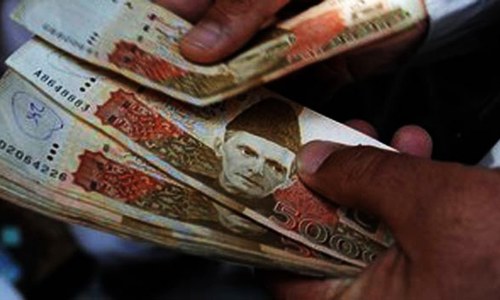KARACHI: The State Bank of Pakistan (SBP) has asked all banks to improve their capacity for control of money laundering, especially by training their staff here and abroad in this respect.
SBP Governor Ashraf Mahmood Wathra held a meeting with heads of all banks on Monday and later briefed the media on the meeting in the presence of the bankers.
But the governor started his briefing with recent rumours about unnecessary foreign travel of bankers spread through social media.
He said the rumours about unnecessary foreign travel of officials of a particular bank had created a panic-like situation over the weekend.
Financial institutions asked to implement in-house system to detect differences between values declared in documents and prevailing market prices
Mr Wathra said he had discussed a number of issues with the heads of banks but the prime and dominating subject was money laundering on which several decisions had been made at the meeting.
A US State Department report released in the first week of this month labelled Altaf Khanani group a money laundering organisation and accused it of laundering billions of dollars for organised crime and terrorist outfits.
The report implicated Pakistan in money laundering by saying that the Altaf Khanani money laundering organisation (Khanani MLO) was based in the country. The group, which was designated a transnational organised crime group by the United States in Nov 2015, facilitates illicit money movement between Pakistan and the United Arab Emirates, the US, the United Kingdom, Canada and Australia, among other countries, according to the report.
It said there was a substantial demand for money laundering and illicit financial services in Pakistan due to its black market economy and challenging security environment.
The report jolted the high-ups in Islamabad already under pressure because of terrorism and corruption prevailing in different segments of government and economy.
The government took the report seriously and the State Bank adopted a number of measures to dispel the impression that money laundering was growing in the country.
Referring to the decisions, the SBP governor asked banks to “implement an in-house system to detect differences between the values declared in the documents and prevailing market prices”.
He urged banks to become more diligent when dealing with international trade transactions and said: “The banks must put in place subjective and objective controls to identify trade transactions of related parties.”
He said banks “must have more specific guidance, policies and procedures in place to address the overall risks of trade-based money laundering”.
“Ensure that your transaction monitoring processes and systems are robust to flag suspicious transactions and such transactions are properly investigated and escalated. Regular compliance checks, particularly on transactions that have not been escalated, should be performed for quality assurance purposes,” he said.
“Provide adequate and specific training on the financial crime risks prevalent in the trade financing and forex operations to relevant staff,” he said. “The SBP will support and guide any exercises by banks and financial institutions to achieve this objective.”
Mr Wathra said some trade transactions had the elements of under invoicing and over invoicing which facilitated transfer of value across borders. “Primary responsibility in this regard lies with the Customs. However, since documents are negotiated and L/Cs are settled through banking sector, banks are required to enhance their capacity to process foreign trade transactions with ‘extreme care’ and diligence.”
He said illegal forex operators might have accounts with banks through which they might be conducting illegal remittance business. “Banks are required to enhance their customer diligence processes to avoid such relationships.”
He asked banks to monitor the transaction patterns of their customers and report suspicious activities to the Financial Monitoring Unit of the SBP.
He said the SBP would continue to encourage banks to send their staff abroad for advanced trainings, technology acquisition and occasional meetings of board of directors or to manage their overseas networks. He gave banks 90 days to submit their foreign travel policies.
Published in Dawn, March 14th, 2017















































